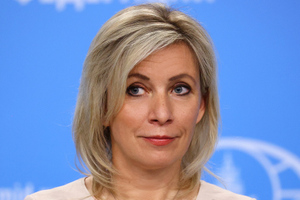The ban on the issuance of Schengen visas to Russians. What is important to know

How can the ban on the issuance of Schengen visas to Russians be implemented?
An informal meeting of EU foreign ministers will be held in Prague on August 30-31, during which the issue of restricting the issuance of tourist visas to Russians will be discussed, Anita Hipper, a representative of the European Commission (EC), said on August 18. “The EC stands for coordinated action. Discussions are ongoing among EU members for the latest information. I want to remind you that an informal meeting of foreign ministers will be held in Prague on August 30-31, discussions will also touch upon the issue of issuing visas to Russians traveling to the EU,” she said during the briefing.
A TASS diplomatic source in Brussels specified that the focus of the discussion will be the issue of amending the Schengen legislation in order to limit the issuance of visas to certain categories of Russian citizens, there is no talk of a complete ban yet. Also, according to him, the ministers will discuss the coordination of actions of the EU countries within the framework of their national competencies. A number of states, including Estonia and Finland, came forward with such an initiative, he added. Earlier, German government spokesman Steffen Hebestreit said that the ban on issuing visas to Russians was submitted for discussion as part of the preparation of the seventh package of EU sanctions against Russia.
“At the first stage, the creation of a voluntary system to reduce by several times the number of tourist visas issued to Russian citizens on a daily basis will be considered. Those EU states that are already ready for this step will be able to immediately join this scheme. Such a system will make it possible to work out the optimal forms of visa restrictions, which other EU countries will later be able to join, ”said an unnamed TASS interlocutor. He noted that visas will continue to be issued to a certain category of citizens for humanitarian reasons, including journalists, political opposition and those who need treatment in the EU. The interlocutor of the state agency added that amending the Schengen agreement is a legally difficult process, so visa restrictions are likely to
The European Commission has not yet commented on the TASS information.
The initiator of the discussion on the ban on issuing visas to Russians to travel to European countries was Ukrainian President Volodymyr Zelensky, who called on Western countries to take such a step in an interview with The Washington Post. “The most important sanctions are the closure of borders. Let them live in their own world until they change their philosophy. [...] Whatever Russians they are… send them back to Russia. Then they will understand,” Zelensky said.
Russian presidential spokesman Dmitry Peskov, commenting on Zelensky's words, said that attempts to isolate Russians or Russia is a futile process. The official representative of the Russian Foreign Ministry, Maria Zakharova, said that EU countries do not have the right to restrict the issuance of visas to an entire nation.
Read on RBC Pro Pro How the economic miracle led Japan to the “lost 30th anniversary” ArticlesPro From "owl" to "lark":is it possible to change your chronotype?What mistakes of managers deprive employees of motivation in difficult conditions Instructions Pro 8 million employees worked in foreign companies.What happens to them Articles Pro Recognize the future leader:how to determine the potential of employeesThe Pursuit of Happiness: Why Strong Motivation Leads to Failure Researchwhy strong motivation leads to research failureswhy strong motivation leads to research failuresWho supports the EU visa ban
The first EU country to support Zelensky's call was Estonia. “Stop issuing tourist visas to Russians. Visiting Europe is a privilege, not a human right. Air traffic from Russia is closed. While the Schengen countries issue visas to Russians, the burden is borne by Russia's neighbors - Latvia, Estonia, Finland. It’s time to stop tourism from Russia now,” Prime Minister Kaya Kallas wrote on her Twitter account. A week later, Tallinn announced the closure of the border for Russians with Schengen visas issued by Estonia. Tallinn is also considering closing the border to Russian citizens with Schengen visas issued by other countries participating in the agreement.
The Ministry of Internal Affairs of Latvia proposed to suspend the issuance of repeated residence permits to Russians Politics
Other Baltic countries have also joined Estonia's position. “I believe that, along with sanctions, it is necessary to ban the issuance of Schengen visas to Russian citizens,” said Latvian Foreign Minister Edgars Rinkevich. His Lithuanian counterpart Gabrielius Landsbergis, in turn, proposed to annul the Schengen tourist visas already issued to Russians. “The best thing would be if it were a European decision that would simply cancel these visas and everyone would stop issuing them,” he said.
Polish Deputy Foreign Minister Piotr Wawrzyk said that his country not only supports the all-European ban on issuing visas to Russians, but is also developing a corresponding concept at the national level. The Czech Republic, which currently holds the EU presidency, is also in favor of visa restrictions. “A total ban on the issuance of visas for Russians by all EU member states could be another very effective sanction against Russia. In the period of the current Russian aggression, which the Kremlin continues to increase, there can be no question of tourism familiar to Russian citizens, ”said Jan Lipavsky, Czech Foreign Minister. According to France Presse, the Czech diplomat intends to convince the head of European diplomacy, Josep Borrell, of the need for a ban.
Of the Nordic countries, the initiative at the European level is supported by Helsinki and Copenhagen. Finnish Prime Minister Sanna Marin considers it wrong that "Russians can live as if nothing had happened and travel to Europe as tourists" after the start of the military operation in Ukraine. Against this background, the country announced a ten-fold reduction in the number of visas issued to Russians from September 1. Danish Foreign Minister Jeppe Kufud said that if the EU fails to agree on a ban on the issuance of Schengen visas to Russians at the European level, then Copenhagen will consider options for such restrictions at the national level. Later, the Swedish authorities also advocated restricting the issuance of visas to Russians, rejecting the idea of a total ban.
Almost six months ago, Sammy Mahdi, the Secretary of State for Migration and Asylum of Belgium, also called for a pan-European ban on issuing visas to Russians. “Russia's reckless attack forces us to be careful of Russians wishing to come to Belgium. At the moment, Russians are not welcome here, a general ban on issuing visas to Russians should not be taboo,” he said on February 24, calling for a ban on both short-term and long-term visas.
Who does not support the ban on issuing visas to Russians
The only European head of state to condemn the call to introduce visa restrictions for Russians was German Chancellor Olaf Scholz. “I can hardly imagine it,” he said during a summer press conference, answering a question about the prospects for a pan-European ban. The chancellor explained that the responsibility for the situation in Ukraine lies with the Russian leadership, and not the citizens of the country. He later added that he "difficulty accepting the idea." “It is important that we understand that many are fleeing Russia because they do not agree with the Russian regime. The decisions we make should not make it harder to leave the country, get away from the leadership and the dictatorship,” Scholz said.
According to Wawrzyk, the initiative to ban the issuance of visas to Russians is also not supported by France and the Netherlands. At the same time, the politicians of the two countries did not openly oppose the ban. On Friday, August 19, Politico published an article in which Cypriot and Greek officials also spoke out against the ban. “It would be the wrong decision. We believe in people-to-people contacts, and even Turkish citizens are issued visas by the Cypriot authorities, so we do not believe that this measure has any significance for the Russians,” Cornelios Corneliou, Secretary General of the Ministry of Foreign Affairs of Cyprus, told the publication. The Portuguese Foreign Ministry also did not support visa restrictions for Russians, noting that "the main goal of the sanctions regime should be to punish the Russian military machine, not the Russian people."
The European Commission announced discussions between EU member states and coordination of actions. “EU countries must comply with their international obligations and ensure the issuance of visas to a category of people, including family members, humanitarian workers, journalists, residents,” the EC representative stressed. Josep Borrell called the initiative of a total ban on issuing visas to Russians rather controversial and said it was a bad idea.
The ban on issuing visas to Russians was not supported in the United States either . Julie Stafft, Deputy Assistant Secretary of State for Consular Affairs, commenting on Zelensky's appeal to Western countries, said that Russians can obtain an American visa at any US diplomatic mission abroad. The embassy in Moscow, she said, does not issue visas due to restrictions imposed by the Russian authorities.
Articles criticizing the idea of a ban on issuing Schengen visas to Russians have appeared in a number of leading foreign publications. In particular, publications were published in the European edition of Politico, the Spanish newspaper El Pais, the American magazine Newsweek, The Wall Street Journal and the British magazine The Spectator.
Legal aspects of the visa ban
The implementation of the ban on issuing visas to Russians may face a number of legal problems. Thus, the discussion scheduled for the end of August at the EU level will take place without the countries that are members of the Schengen zone, but not members of the EU - Norway, Liechtenstein, Iceland and Switzerland. The authorities of the latter have already declared their readiness for consultations if the EU countries propose to amend the Schengen Agreement.
The Convention on the Application of the Schengen Agreement of June 14, 1985 does not contain a clause on the possibility of denying entry to visa holders on a national basis, however, entry may be refused if a third-country national holding a Schengen visa does not satisfy a number of conditions of the agreement. Thus, a citizen must be able “if necessary to submit documents justifying the purpose and conditions of the intended stay, and have sufficient means of subsistence both for the period of his intended stay, and for returning to the country from which he arrives, or for transit to a third state to which he is guaranteed access, or is able to legally acquire such funds. In addition, he should not be the subject of a request for information for the purpose of denial and should not be considered as a person
About 70% of Russians said they had never vacationed abroad Society
Accordingly, in order to prohibit the issuance of tourist visas to Russians, the convention should stipulate new rules for restricting the issuance of visas to citizens of third countries not on an individual, but on a collective basis. In addition, the European Union has its own Visa Code, which also states that member countries of the association must comply with the principle of individual, rather than collective assessment of citizens who have applied for a visa. Among the possible reasons for refusal are the provision of false documents, lack of medical insurance, exceeding the permitted period of stay in the EU country, insufficient justification of the purpose of the trip. The ban on issuing visas to Russians would also contradict the EU Charter, which bans collective responsibility and discrimination.
If the visa ban is considered as part of the seventh package of sanctions against Russia, then approval of all 27 EU member states is necessary for its approval, and there are still disagreements in their ranks on this issue. At the same time, such member countries as Cyprus, Bulgaria, Croatia and Romania are not included in the Schengen area, and the decision on non-issuance of visas in their case must be made at the national level. Also, the European Union will need countries outside the union, members of the Schengen area, to join the seventh package of sanctions. In addition, the rules of the European Union contain provisions that sanctions should be targeted and imposed on specific individuals or relate to the economic and financial aspects of relations with the country against which restrictions are introduced.
Where Russians go abroad. Infographic Society
The principle of collective responsibility is alien to the values of the European Union, so it is not surprising that many European politicians continue to speak out against the ban on issuing visas to Russians, Andrey Kortunov, director general of the Russian International Affairs Council, told RBC. However, he does not rule out a change in the position of a number of countries on the visa issue in the event of a referendum on joining Russia in Kherson, which will become a new factor complicating relations between Moscow and Brussels. “It can be assumed that for some hesitant countries that have not yet decided on their position regarding a possible ban on the issuance of Schengen visas to Russia, this will become another argument in favor of such a decision. The set of tools of economic pressure that are now being used against Moscow is quite limited.
Who will be affected by EU visa sanctions
If the European Union imposes restrictions on the issuance of visas to Russians, they will affect certain categories of citizens. According to a July poll by the Public Opinion Foundation, 69% of Russians have never been abroad. Only 2% of the respondents went abroad during the last year. According to the Ministry of Internal Affairs, in the first half of 2022, almost 2.5 million foreign passports were issued in Russia, which is 45% more compared to the same period a year ago. There is no up-to-date data on the total number of Russians who have foreign passports.
According to the statistics of the analytical center of the Association of Tour Operators of Russia (ATOR), in 2021 Russians made 10 million trips abroad for tourism purposes. Turkey became the leader with an indicator of about 4.7 million tourist trips. In fifth place is Cyprus, a member of the EU, with 560,000 trips, followed by Greece with 235,000 trips. In the ranking of the 20 most popular destinations, in addition to Cyprus and Greece, there are only two EU countries - Croatia and Bulgaria. In 2019, ATOR recorded more than 22 million tourist trips. Russians most often chose Turkey (6.9 million trips), Germany (1.4 million trips) and Italy (1.36 million trips).
According to the EU, in 2021, Russians received only 536 thousand Schengen visas, while in 2019 this figure exceeded 4 million.
In the first six months of 2022, according to the FSB, Russians made just over 8.4 million trips abroad. The most popular destinations were Abkhazia (1.94 million trips), Turkey (1.39 million trips), Kazakhstan (772 thousand trips), UAE (466 thousand trips), Egypt (428 thousand trips), Armenia (314 thousand . trips), Ukraine (370 thousand trips) and Finland (301 thousand trips).




























































